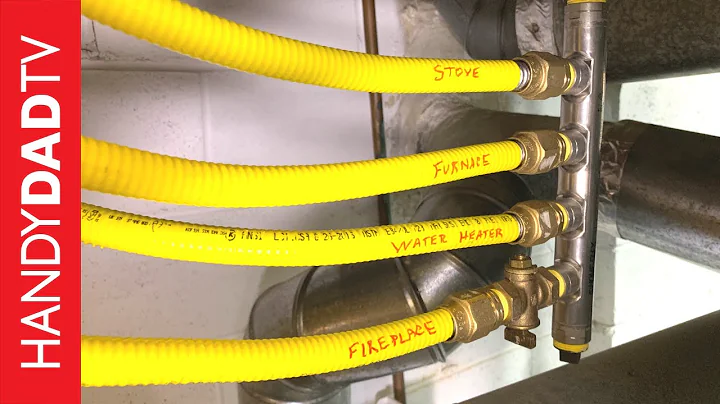Quick and Easy DIY AC Drain Line Unclogging: Save Money on Repairs
Table of Contents
- Introduction
- Identifying the Problem
- Possible Causes
- Understanding the Drain Line
- Cleaning the Drain Line
- Preventing Future Clogs
- Pros and Cons of DIY Drain Line Cleaning
- Conclusion
- Highlights
- FAQ
Introduction
Leaking water on the garage floor can pose a significant problem for homeowners. Not only can it cause damage to the floor and surrounding areas, but it can also indicate issues with the air conditioning system or other appliances. In this article, we will explore the causes of leaking water on the garage floor and provide a step-by-step guide to cleaning the drain line to resolve the issue.
Identifying the Problem
Before diving into the solution, it is crucial to identify the source of the water leak. In the case discussed, the homeowner ruled out the washing machine as a potential cause since there was no visible water dripping from it. The next suspect was the air conditioning unit, as clogs in the drain line are a common issue that leads to leaks. Since the drain line runs from the unit all the way to the garage floor, it is essential to inspect the line for any clogs or blockages.
Possible Causes
When it comes to air conditioning units, clogs in the drain line are a primary cause of leaks. These clogs can occur due to debris, mold, or algae buildup in the line over time. In some cases, a clogged air filter can also lead to ice formation on the coils, resulting in excessive water in the drain pan. Understanding the possible causes can help in effectively treating the issue.
Understanding the Drain Line
The drain line in an air conditioning system plays a crucial role in removing condensation from the unit. It is designed to carry the condensation through the line and down to the floor or outside. In some instances, the drain line may run through the slab of the garage floor and then pop up outside to allow for proper drainage. This setup requires periodic maintenance to ensure smooth water flow and prevent clogs.
Cleaning the Drain Line
Cleaning the drain line is a simple task that can often be done without the need to call a professional. One effective method is to use a garden hose to clear any blockages in the line. By inserting the hose into the drain line and allowing water to flow through, you can dislodge and flush out any debris or buildup. It is essential to find a way to block the entry point during this process to avoid water rushing into unwanted areas.
Preventing Future Clogs
To prevent future clogs in the drain line, regular maintenance is key. This includes changing the air filters regularly to ensure proper airflow and reducing the chances of ice formation. Additionally, installing a trap in the drain line can help prevent sewer gases or other contaminants from entering the system and causing clogs. Following these preventive measures can save homeowners from recurring issues and expensive repairs.
Pros and Cons of DIY Drain Line Cleaning
Cleaning the drain line by yourself has its advantages and disadvantages. On the positive side, it can save you money by avoiding the need to hire a professional. It is a relatively simple task that doesn't require specialized tools. However, it's important to note that if you are not comfortable handling DIY repairs or if the problem persists after cleaning the drain line, it is advisable to seek the assistance of a professional for a thorough inspection and repair.
Conclusion
Leaking water on the garage floor can be a frustrating problem, but by understanding the potential causes and taking proactive measures, homeowners can resolve the issue efficiently. Regular cleaning and maintenance of the drain line are essential to prevent clogs and ensure the proper functioning of the air conditioning system. By following the steps outlined in this article, you can successfully clean the drain line and enjoy a leak-free garage.
Highlights
- Leaking water on the garage floor can indicate issues with the air conditioning system.
- Clogs in the drain line are a common cause of leaks.
- Cleaning the drain line with a garden hose can effectively remove debris and buildup.
- Regular maintenance and filter changes can prevent future clogs.
- DIY drain line cleaning has pros and cons, and professional help may be needed in some cases.
FAQ
Q: How often should I clean the drain line?
A: It is recommended to clean the drain line every few years or as needed if you notice any leaks or reduced water flow.
Q: Can a clogged drain line cause other issues with the air conditioning system?
A: Yes, a clogged drain line can lead to ice formation on the coils and cause the air conditioner to cut off. It is essential to address clogs promptly to prevent further damage.
Q: What should I do if cleaning the drain line doesn't resolve the issue?
A: If the problem persists after cleaning the drain line or if you are uncomfortable performing DIY repairs, it is best to contact a professional HVAC technician for a thorough inspection and repair.
Q: Are there any preventive measures I can take to avoid drain line clogs?
A: Yes, regularly changing air filters, installing a trap in the drain line, and scheduling routine maintenance can help prevent future clogs and ensure the proper functioning of your air conditioning system.
Q: Can a clogged drain line lead to water damage in other areas of the house?
A: In some cases, a clogged drain line can cause water to back up and overflow into other parts of the house. It is important to address the issue promptly to prevent further damage.
Resources:







